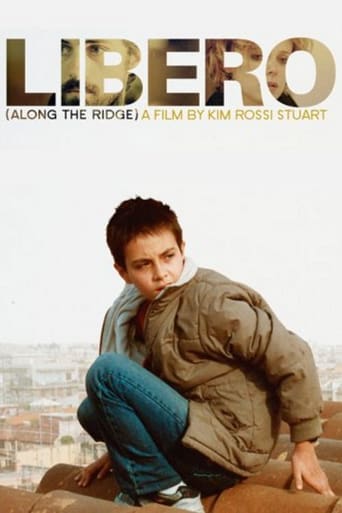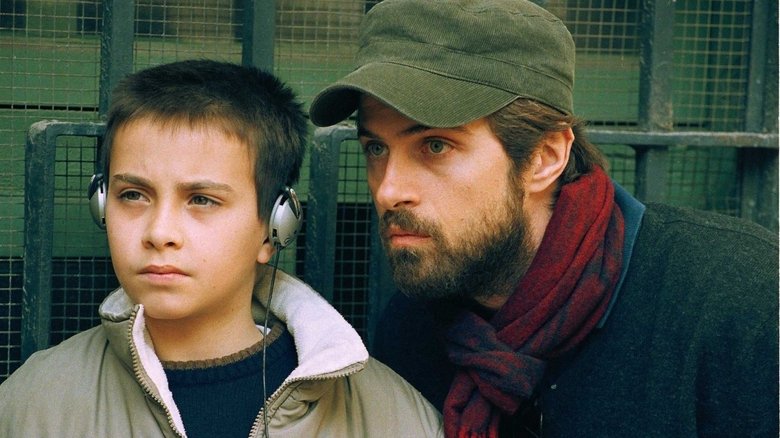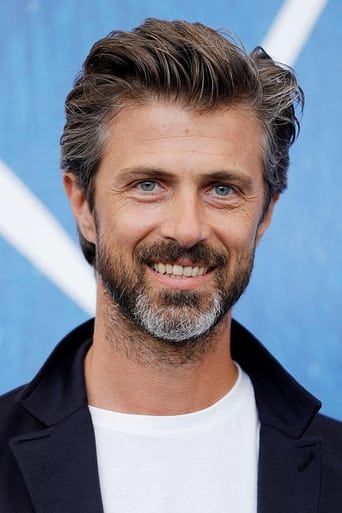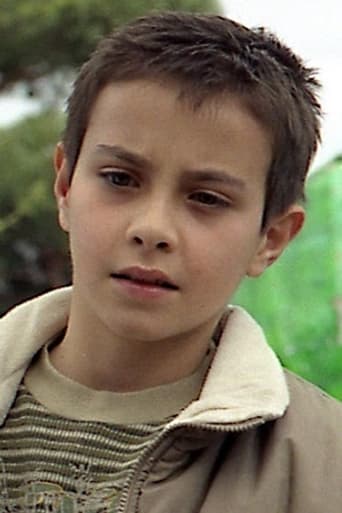

Along the Ridge (2006)
A young father and his two children struggle to find harmony after his wife leaves them for another man.
Watch Trailer
Cast
Reviews
Excellent, Without a doubt!!
In truth, there is barely enough story here to make a film.
This film is so real. It treats its characters with so much care and sensitivity.
By the time the dramatic fireworks start popping off, each one feels earned.
Italian title: 'Anche libero va bene' ('Sweeper's okay too').Kim Rossi Stewart is a well known actor in Italy. Recent notable performances: 'Criminal Romance' (2005, Michele Placido), 'The House Keys' (2004. Gianni Ameliio). In this, his superb directorial debut, the subject is childhood and dysfunctional families. It's a difficult one to deal with in a fresh way, perhaps. But the situation of newly free-lancing photographer Renato (Stewart), his 11-year-old son, Tommaso/Tommi (Alessandro Morace), and Tommi's older sister Viola (Marta Nobili) does emerge as different, yet true to life. Tommi, the main character, is a somber boy, shy and quiet, a good swimmer. Viola is the bright light in the house, a cheerful soul. It seems Renato is a single father, and a troubled one. He's a photographer without much work, in financial difficulties, a rageaholic, borderline bipolar, who often screams at the two children over little foul-ups in the house.Then one day the wife and mother of the family, Stefania (Barbora Bobulova), turns up, tearful, cowed, terrified of Renato's rage. She comes and goes, we learn, remaining, apparently, unable to be faithful to one man and also involved with a rich guy. Renato is very reluctant to take her back. He also inappropriately involves the kids in the decision about this, and lets them hear the foul words he applies to his wife. As time passes Renato becomes more emotionally stable at home with Stefania around, though he seems unable to cooperate on a job, trying to tell the director to photograph a camel when he needs a shot of a car, then walking off the set, and already having cut off his former employers. Tommi is the realistic one. He knows Stefania will leave again, and hence finds it hard to give her affection. His freedom is to go up on the roof and look down through a pair of binoculars. This is his refuge. He has a friend now, Antonio, son of rich neighbors. He takes Antonio up to share the roof with him. Tommi dominates the film with his sad eyes in an impassive face. His heart seems to threaten to become frozen, and sometimes when it opens, it quickly shuts again. Despite too much pushing from his father, he still does well in swimming, though it never seems as if he cares. In class he chooses to stay seated next to Claudio, a new boy who has reacted to the trauma of his father's death by becoming mute. Tommi writes "I love you" to a girl he's next to in ceramics class, but when she finds the note, denies that he had anything to do with it. Stewart gets excellent acting from everyone, most remarkably from young Morace, who doesn't seem "actor-y" at all but completely genuine. The direction in other ways is not as inventive or fresh as it could have been. The camera-work is mechanical in following people around. But the deeply touching story makes that unimportant. One gets a strongly particular sense of the family here, of its instability and sadness, especially Tommi's; the film seems to have less ability to open itself up to the outside world and show the characters' relationship to it, in spite of scenes at Tommi's class at middle school. After Ranato's rejection of Tommi for giving up the swim team, a contrast comes when his friend Antonio's father invites him to go fishing, just the two of them, Antionio being in Naples with his grandmother for the day, and Tommi has dinner with Antonio's family to share the fish they catch. This father isn't judgmental but helpful, and the family is a serene and happy one. As always it is disturbing to see children being subjected to a family life that is only wounding them, and which they will at best survive. Things are particularly bad when Tommi drops out of a swim match and finally declares he doesn't want to swim any more (we know he always preferred to play football). "Who gives a damn!" Renato declares. You;'re no son of mine." What a child needs is first for both parents to be present in their life and second to have unconditional love and support. They often don't get either. 'Along the Ridge' is courageous in showing parents who fail and a child who somehow manages to deal with that. As things get worse for Renato, Tommi's life takes on a tragic dimension and the film gains some of the resonance of the great Italian neorealist films. Those who've grown up in a dysfunctional family will understand the cold comfort Tommi feels escaping from his father's meltdown on a ski trip with Antonio and his cheerful, decent parents. The title in Italian refers to a reconciliation between Tommi and his dad. He's going to let Tommi play football after all ad the position Tommi favors is midfielder, but dad likes sweeper. "Sweeper's okay too," says Tommi. In context, it's a line that will make you weep.Shown as part of the San Francisco International Film Festival 2007.
Great debut, the one of Kim Rossi Stuart as a director, without pathetic scenes, tough and with no sappy concessions to an impossible happy end. A true world described with a true language and a deep tenderness, but knowing that certain situations allow very little tenderness to those who live them. A world seen through the bright, deep and severe eyes of a wonderful boy who is the focus of his family, the benchmark for his sister, the "strong man" both his mom and his dad need for different reasons, unsettled and insecure as they are. For the people living outside Italy who saw or have to see this movie, the world described in it is our world so don't go looking for some kind of "Kramer vs. Kramer" calm and aseptic atmosphere, here.There are plenty of beautiful moments in the movie, but one would be enough to love it and it's when the father and his children come back home one evening, Tommi raises his eyes and he sees their house's windows: it's dark, no light. In the lift, he whispers: "The lights were off", mom has gone away again, he thinks without saying it. The look that father and son exchange is so intense, their desperation so palpable that it takes your breath away. I repeat, this scene would be enough. But there's much, much more.
I recently saw this at the 2007 Palm Springs International Film Festival and of the 31 films I saw there this film makes my top six. Actor Kim Rossi Stuart makes an impressive directorial debut with this film. Stuart began his acting career as a child actor and probably from that experience he gets the most from his two young actors in the principal cast who are making their acting debuts on film. Stuart casts himself as Renato who is a single father raising a son, Tommi (Allessandro Morace) and a daughter, Viola (Marta Nobili). This is a macho dominated family unit with all the pressure put on Tommi from his father Renato who wants to live his own childhood through Tommi and dominates and supersedes Tommi's own ambitions. Sister Viola kind of gets a free pass to skate through life from Renato. We soon learn that the children's mother Stefania (Barbora Bobulova) is very much alive as she repentantly returns to ask to be once again accepted into the household. She apparently has a history of extra-marital affairs but again in the macho society of this film there is no contesting child custody or the home to live in on her part. Renato has the ultimate say if she can stay or leave and the home and children are his. Both parents obviously love their children but both have emotional problems. Stefania as the straying mother and housewife and Renato who is a fun and creative guy but his broken marriage eats at him and he flares up at the children but also lovingly plays around with them like a kid himself. His do-it-my-way attitude spills out to his work environment also as a freelance film cameraman and causes further problems for him. The title Along the Ridge comes from the building rooftop where Tommi keeps a secret hiding place precariously perched at the edge of a steep roof high above the street below. Good story from Linda Ferri, Francesco Giammusso, Federic Starnone and Stuart with excellent cinematography from Stefano Falivene. I would give this an 8.5 out of 10 and recommend it.
Tommi, 11 years old, lives with his older sister Viola and his father Renato. At the beginning of the film we don't know where Stefania, their mother, is; but she appears again, and, even we came to know that in the past she hasn't been able to stay in the family and grow up her children, this time it seems she came to stay. Viola is happy, Tommi is more skeptical. Time will tell who was right. "Libero" is a defensive soccer player who doesn't have a specific opponent; Tommi, who is a very good swimmer but doesn't like to swim, at the end of the film says "Anche libero va bene" ("Even libero is OK"), when finally his father agrees to send him to a soccer school, even he'd better be a midfielder. This is a difficult film, dealing with the over-discussed family subject in an ordinary, but still very different way, aided by a superb interpretation of all the four leading characters, with a special mention for the first-time-on-screen Alessandro Morace as Tommi. Barbora Bobulova could be the best Italian actress if she was born in Italy (but we adopt her with great pleasure), and Kim Rossi Stuart, for his debut as director, is also convincing as Renato, even if he had to substitute at the last moment Sergio Rubini, who was the original choice. Probably the best Italian film of 2006.


